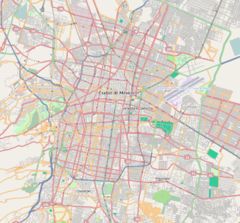Ferrería/Arena Ciudad de México metro station
| STC rapid transit | |||||||||||
 Platforms, 2022 | |||||||||||
| General information | |||||||||||
| Location | Antigua Calzada de Guadalupe Azcapotzalco Mexico City Mexico | ||||||||||
| Coordinates | 19°29′27″N 99°10′26″W / 19.490746°N 99.173841°W | ||||||||||
| Operated by | Sistema de Transporte Colectivo (STC) | ||||||||||
| Line(s) | |||||||||||
| Platforms | 2 side platforms | ||||||||||
| Tracks | 2 | ||||||||||
| Connections | |||||||||||
| Construction | |||||||||||
| Structure type | Underground | ||||||||||
| Other information | |||||||||||
| Status | In service | ||||||||||
| History | |||||||||||
| Opened | 21 December 1983 | ||||||||||
| Previous names | Ferrería | ||||||||||
| Passengers | |||||||||||
| 2023 | 6,941,376[1] | ||||||||||
| Rank | 60/195[1] | ||||||||||
| Services | |||||||||||
| |||||||||||
| |||||||||||
Ferrería/Arena Ciudad de México (ⓘ; formerly Ferrería) is a station along Line 6 of the Mexico City Metro.[2][3] It is located in the Azcapotzalco municipality, in the north of Mexico City.[2] In 2019, the station had an average ridership of 23,779 passengers per day.[4]
Name and iconography
[edit]Before 2012, the station was known only as Ferrería and its icon depicted the head of a cow. This was a reference to a cattle ranch that existed nearby, known as Ferrería; there was also a train station that serviced this ranch.[2]
In 2012, the Arena Ciudad de México was inaugurated, built-in part of the grounds of the former Hacienda Ferrería and within walking distance of the Ferrería station. The name of the station was then changed on 29 November 2012 from Ferrería to Ferrería/Arena Ciudad de México. The pictogram was also modified, with the new icon depicting the stylized façade of the Mexico City Arena.[5][2]
General information
[edit]
Metro Ferrería/Arena Ciudad de México runs under Avenida Antigua Calzada de Guadalupe and serves the Colonia Santa Catarina neighbourhood.[2] The station was opened on 21 December 1983.[6]
The station connects with the Fortuna station, servicing the Ferrocarril Suburbano, through an underground tunnel.[7]
Arena Ciudad de México, an indoor sports and entertainment venue is within walking distance from the station.
Ridership
[edit]| Annual passenger ridership | |||||
|---|---|---|---|---|---|
| Year | Ridership | Average daily | Rank | % change | Ref. |
| 2023 | 6,941,376 | 19,017 | 60/195 | +17.58% | [1] |
| 2022 | 5,903,428 | 16,173 | 66/195 | +67.50% | [1] |
| 2021 | 3,524,534 | 9,656 | 88/195 | −16.54% | [8] |
| 2020 | 4,222,934 | 11,538 | 86/195 | −51.35% | [9] |
| 2019 | 8,679,563 | 23,779 | 59/195 | −0.67% | [4] |
| 2018 | 8,738,309 | 29,940 | 61/195 | +5.28% | [10] |
| 2017 | 8,299,914 | 22,739 | 67/195 | −3.98% | [11] |
| 2016 | 8,644,085 | 23,617 | 68/195 | −1.69% | [12] |
| 2015 | 8,792,855 | 24,090 | 64/195 | +12.10% | [13] |
| 2014 | 7,843,776 | 21,489 | 81/195 | −3.36% | [14] |
Services and Accessibility
[edit]It has accessibility for the disabled and your safety. It has services such as turnstiles, lockers, electric scales and information screens.
Gallery
[edit]-
Entry sign to the station with the previous name and pictogram
-
Entry sign to the station with the current name and pictogram
References
[edit]- ^ a b c d "Afluencia de estación por línea 2023" [Station traffic per line 2023] (in Spanish). Sistema Transporte Colectivo Metro. 2024. Archived from the original on 27 January 2024. Retrieved 24 January 2024.
- ^ a b c d e "Ferrería- Arena Ciudad de México" (in Spanish). Metro CDMX. Retrieved 3 April 2020.
- ^ Archambault, Richard. "Ferrería » Mexico City Metro System". Retrieved 12 May 2012.
- ^ a b "Afluencia de estación por línea 2019" [Station traffic per line 2019] (in Spanish). Sistema Transporte Colectivo Metro. 2020. Archived from the original on 8 April 2020. Retrieved 3 May 2020.
- ^ "¿Por qué algunas estaciones del Metro cambiaron de nombre?". El Universal (in Spanish). 14 July 2017. Retrieved 3 April 2020.
- ^ Monroy, Marco. Schwandl, Robert (ed.). "Opening Dates for Mexico City's Subway". Retrieved 12 May 2012.
- ^ "Estación Fortuna les hace la vida imposible". El Universal (in Spanish). 27 May 2008. Retrieved 3 April 2020.
- ^ "Afluencia de estación por línea 2021" [Station traffic per line 2021] (in Spanish). Sistema Transporte Colectivo Metro. 2020. Archived from the original on 7 March 2022. Retrieved 7 March 2022.
- ^ "Afluencia de estación por línea 2020" [Station traffic per line 2020] (in Spanish). Sistema Transporte Colectivo Metro. 2021. Archived from the original on 21 June 2021. Retrieved 21 June 2021.
- ^ "Afluencia de estación por línea 2018" [Station traffic per line 2018] (in Spanish). Sistema Transporte Colectivo Metro. 2019. Archived from the original on 6 June 2019. Retrieved 7 April 2020.
- ^ "Afluencia de estación por línea 2017" [Station traffic per line 2017] (in Spanish). Sistema Transporte Colectivo Metro. 2019. Archived from the original on 3 May 2020. Retrieved 3 May 2020.
- ^ "Afluencia de estación por línea 2016" [Station traffic per line 2016] (in Spanish). Sistema Transporte Colectivo Metro. 2017. Archived from the original on 3 May 2020. Retrieved 3 May 2020.
- ^ "Afluencia de estación por línea 2015" [Station traffic per line 2015] (in Spanish). Sistema Transporte Colectivo Metro. 2016. Archived from the original on 3 May 2020. Retrieved 6 May 2020.
- ^ "Afluencia de estación por línea 2014" [Station traffic per line 2014] (in Spanish). Sistema Transporte Colectivo Metro. 2015. Archived from the original on 3 May 2020. Retrieved 6 May 2020.




